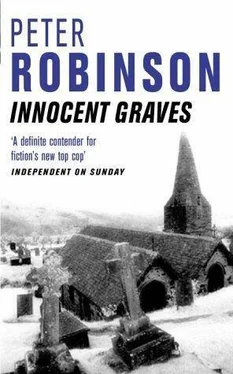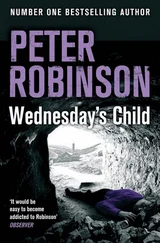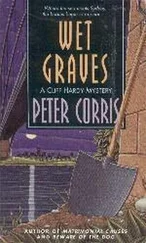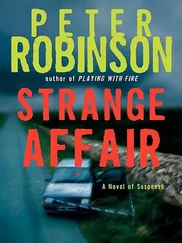“They do? Why?”
“Well, I know nothing of police work, of course, but I fail to understand why you should require my impressions of Deborah in order to apprehend the criminal who attacked and murdered her.”
“What kind of questions do you think I should be asking?”
She frowned. “I don’t know. About strangers in the area, that sort of thing.”
“Have you noticed any suspicious strangers hanging around the area lately?”
“No.”
Banks blew his nose. “Sorry. Well, that covers that one, doesn’t it? Now, what about Deborah’s faults?”
“Faults?”
“Yes, was she mischievous, disobedient, dishonest, willful?”
“No more than any other child of her age. Less than most, actually.” She thought for a moment. “No, I’d say if Deborah did have a fault it was that she tended to show off her abilities to some extent. She could sometimes make the other girls feel small, or awkward and clumsy. She had a tendency to belittle people.”
“Was she boastful?”
“Not at all. No, that’s not what I mean. She never boasted about her abilities, she just used them to the full. She wasn’t the kind to hide her light under a bushel. Half the time it was as if she didn’t even realize she was so much brighter and more fortunate than many. She liked the way her quickness with figures impressed people, for example, so she would add up or multiply things in her head quicker than some of the other girls could do it with a calculator.”
“That’s one good way to make enemies.” Banks remembered his own school math reports: Could do better than this; Harder work needed; Watch that arithmetic!
“It was hardly serious,” Dr. Green went on, shrugging. “Simply a matter of girlish exuberance, a young woman taking full joy in her talents.” Her eyes sparkled for a moment. “Have you forgotten what it was like to be young, to be popular, gifted?”
“I don’t know that I was ever gifted or popular,” Banks said, with a sidelong glance at Susan, who was smiling down into her notebook. “But I do remember what it was like to be young. I thought I would live forever.”
After the awkward silence that followed, Banks asked, “Was Deborah popular with the other girls?”
“What do you mean?”
“She sounds like a right little madam to me, a proper pain in the neck. I was wondering how she got on with her classmates?”
“Really, Chief Inspector,” Dr. Green said through tight lips. “These were very minor faults I’m talking about. Mostly, Deborah was friendly, cheerful and helpful.”
“Was there any friend in particular?”
“Yes. Megan Preece. Her name’s on the list I gave you.”
“I understand from Daniel Charters,” Banks went on, “that there was some trouble with Ive Jelačić, the sexton.”
“Yes.” Julia Green rubbed her cheek. “He’d been bothering the girls. Saying things, making lewd gestures, that sort of thing.”
“Had Deborah, in particular, complained about him?”
“I believe she had.”
“Did she continue going to the church after Mr. Jelačić made his accusations against Daniel Charters? It was my impression that her father seemed more upset about what Charters had been accused of, rather than what Jelačić did.”
Julia Green paused for a moment, then said, “Yes, yes he was. I don’t understand it myself. The school stands one hundred per cent behind Father Charters, but Sir Geoffrey forbade Deborah from singing with the choir or attending any services.”
“Why do you think he did that?”
“I don’t know. Some people are just…well, very funny about any hint of homosexuality in the ministry.”
“Did Deborah obey him?”
“As far as I know she did. I never saw her there, anyway.”
“Did Deborah keep any of her belongings here at school?”
“All the girls have desks.”
“No lockers or anything?”
She shook her head. “Not the day-girls. They bring what they need from day to day, mostly.”
“Might we have a look?”
“Of course. We’ve canceled classes for the day, so the room should be empty.”
She led them through a maze of high corridors to a small room. It wasn’t like any classroom Banks had ever seen before, with its well-polished woodwork and nicely spaced desks.
“This one,” said Dr. Green, pointing to a desk.
Banks lifted the hinged flap. He hadn’t expected much-school desks are hardly the most private of places-but he was disappointed by how little there was: a couple of school exercise books, a computer magazine, textbooks, pens and pencils. There was also a tattered paperback Jeffrey Archer. Deborah’s intelligence obviously hadn’t stretched as far as her literary taste.
Under the flap, Deborah had taped a photograph of a scruffy pop star Banks didn’t recognize.
Dr. Green saw it and said, with a smile, “We discourage such things, but what can you do?”
Banks nodded. Then he examined the desk surface to see if Deborah had carved any initials, the way he had at school. Again, nothing. Strongly discouraged, no doubt.
“Thanks,” he said to Dr. Green. “Can we have a word with Megan Preece now? Is she here?”
Dr. Green nodded. After stopping back at her office for their raincoats and her umbrella, she led them outside.
“Where are we going?” Banks asked.
“The school infirmary. That’s where Megan is. I’m afraid she had rather a nasty turn when I broke the news in assembly this morning.”
The brick shattered the vicarage window at nine-thirty that morning, waking Rebecca from the uneasy doze she had slipped into after taking three aspirin and a glass of water.
At first she lay there terrified, fearing that someone had broken in. Then, slowly, so as not to make the bedsprings creak, she sat up, ears pricked for any sounds. But nothing came.
She put on her dressing-gown and looked out of the bedroom window. Nothing but the drizzle on the trees and graves, and policemen in capes searching the grounds. She tiptoed downstairs, and when she got to the front room she saw the damage.
Shards of glass lay all over the floor, and some had even got as far as the sofa and coffee-table. The brick had clearly been thrown from the river path, beyond the small garden, an area that was unguarded because it didn’t provide access to the graveyard.
The brick had bounced off the coffee-table and ended up in the far corner by the sideboard. It had a piece of paper wrapped around it, fixed by a rubber band. Slowly, Rebecca bent, picked up the brick and unfolded the paper:
Once you let the devil into your heart he will corrupt every cell in your body and this is what has happened it is clear. You must confess your sins. It is the only way. Or else we must take things into our own hands.
Someone knocked at the back door. Crumpling the note in her pocket, Rebecca gathered her dressing-gown around her and went to see who it was.
“Is everything all right, ma’am?” asked one of the uniformed constables who had been searching the graveyard. “I thought I heard breaking glass.”
“You did,” Rebecca said. “But everything’s fine. Just a little domestic accident.”
“Are you sure?”
“Yes.” Rebecca started closing the door on him. “Thank you, everything’s fine.” When she had shut the door she leaned her back against it and listened. In a few seconds, she heard his footsteps going along the path.
She took out a dustpan and broom and busied herself sweeping up the glass, wondering what she could use to cover the broken window before she caught a chill and died. Maybe that would be best for everyone, she thought. It would be very fitting, too. Hadn’t Emily Brontë died after catching a chill at her brother’s funeral? But no. She wasn’t going to give the miserable, mean-spirited bastards the satisfaction.
Читать дальше












